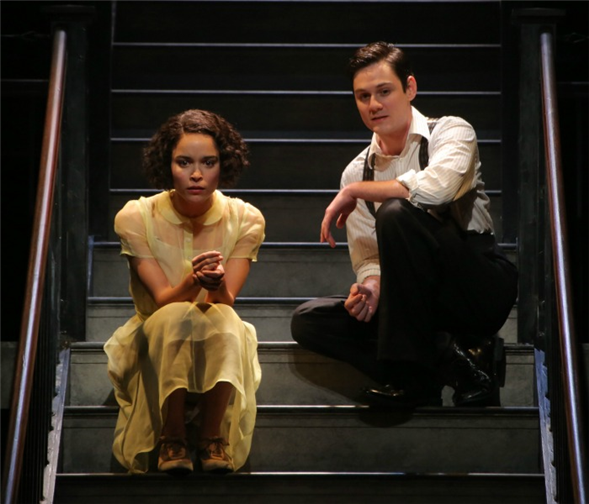Translate Page

Evan Yionoulis talks about directing Adrienne Kennedy's new play
---
Inside the program for He Brought Her Heart Back in a Box at Theatre for a New Audience is a poetic thank-you from the playwright:
"This play. Could not have been written without the room
Facing trees and the iPad given to me by my son Adam Kennedy
And his wife Renee in their house on the lane."
The acknowledgment is sweet and funny but also remarkable considering the author is 86 years old and has been writing for the theatre for over half a century. Adrienne Kennedy's career long predates iPads or even personal computers. Her first play, the Obie-winning Funnyhouse of a Negro, debuted in 1964 when that was still the polite term used to describe black Americans. Her contemporaries include Edward Albee and Amiri Baraka, both of whom she has outlived. But her work has always been avant-garde and forward-looking, even as it excavates history and memory.
He Brought Her Heart Back in a Box, her first new work in a decade, is a play about the past that speaks directly to the current moment. At its core is the relationship between Chris (Tom Pecinka) and Kay (Juliana Canfield), teenagers living in the Jim Crow South in 1941. Chris is white and Kay is "colored," the daughter of a white man who may have killed her black mother. Kay's biracial parentage mirrors that of Kennedy's mother, who was born and raised in a still-segregated Georgia. However, according to a recent interview with The New York Times, it was present-day conflicts that brought the playwright out of retirement. The stories her grandchildren shared about being bullied in school for their ethnically ambiguous appearance stirred up fraught recollections that got Kennedy typing on her new iPad.
"When I directed a workshop in 2015, this play was relevant," says Heart's director Evan Yionoulis. "But to approach it in 2018, after Charlottesville, after the election, it was screaming."
Yionoulis is well-acquainted with Kennedy's particular brand of theatrical time travel, having helmed a revival of her 1992 play Ohio State Murders for Theatre for a New Audience back in 2007. Since Kennedy no longer lives in New York, she hasn't attended any Heart rehearsals, but she's been in close contact with Yionoulis via phone and email. "I feel Adrienne's presence very strongly in the room through her text and through what she's communicated," the director says. "She has shared a lot about the roots of the play in the autobiography of her family, in the feelings that prompted her to write it. That's been beautiful and also unique."
The play is set on the eve of America's entrance into World War II, but Kennedy takes us even further into the past by incorporating elements of older texts, including the 1929 operetta Bitter Sweet and Christopher Marlowe's late-16th-century drama The Massacre at Paris. Making matters even more complex, both of these works are themselves historical, looking back on events from decades earlier. "As with all great writing, Heart continues to reward you every day you work on it -- I continue to discover deep connective threads," says Yionoulis. "Even though an audience may not have the dramaturgical background to get all of that, I think that it sends the molecules in the theatre vibrating in a way that communicates something that's true, and also awakens the mind."
A desire to confront the West's racist and imperialist history has informed Kennedy's work from the beginning -- Funnyhouse of a Negro includes Jesus and Queen Victoria among its characters. But the playwright is also on a relentless quest to advance the dramatic form via text and tech. Before Heart rehearsals began, "we didn't really know how long it would run, because it's not just the text, but the music and the visual layers that create the whole piece," says Yionoulis, who collaborated with video designer Austin Switzer on projections that are central to the lean but intense 45-minute production. "In Ohio State we had some projections but technology is just much more than what was possible then. The premieres Adrienne did in the '90s had slides!"
While stage technology seems to have caught up with Kennedy's theatrical imagination, our culture is still struggling to move beyond the troubled history her works explore. "We're in a situation in our culture right now where we're looking at all of the voices that have been excluded from the canon," says Yionoulis. "I would hope that we would get to a point where we could -- all of us, from whatever background -- be incredibly inclusive in whom we name as our forebears." In order to get there today's playwrights, tapping away on their iPads, might well follow Adrienne Kennedy's example: never forgetting the past but pushing ever forward.
---
TDF MEMBERS: At press time, discount tickets were available for He Brought Her Heart Back in a Box. Go here to browse our current offers.
Regina Robbins is a writer, director, native New Yorker, and Jeopardy! champion. She has worked with several NYC-based theatre companies and is currently a Core Company Member with Everyday Inferno Theatre.
Top image: Juliana Canfield and Tom Pencinka in He Brought Her Heart Back in a Box. Photos by Gerry Goodstein.